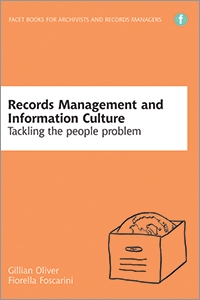
Primary tabs
You don't need to be an ALA Member to purchase from the ALA Store, but you'll be asked to create an online account/profile during the checkout to proceed. This Web Account is for both Members and non-Members.
If you are Tax-Exempt, please verify that your account is currently set up as exempt before placing your order, as our new fulfillment center will need current documentation. Learn how to verify here.
- Description
- Table of Contents
- About the authors
This book explores how an understanding of organizational information culture provides the insight necessary for the development and promotion of sound recordkeeping practices. It details an innovative framework for analyzing and assessing information culture that can be used to develop recordkeeping practices aligned with the specific characteristics of any workplace. LIS students taking archives and records management courses will benefit from the application of theory into practice, while records management and information management educators will find the ideas and approaches discussed in this book useful to add an information culture perspective to their curricula.
1. Background and context
The concept of information culture
Underlying theory
The information culture assessment framework
Why information culture?
Summary and conclusions
Notes
References
2. The value accorded to records
Cultural influences
Attitudes and behaviours
Records management infrastructure
IT usage: The EDRMS challenge
Assessment techniques
Next steps
Summary and conclusions
Note
References
3. Information preferences
Words or pictures?
Sharing information
Assessment techniques
Next steps
Summary and conclusions
References
4. Language considerations and regional technological infrastructure
Language as a social fact
Dealing with your organization’s broader technological context
Assessment techniques
Next steps
Summary and conclusions
Note
References
5. Information-related competencies
The training imperative
Information-related competencies
Assessment techniques
Next steps
Summary and conclusions
References
6. Awareness of environmental requirements relating to records
Researching recordkeeping requirements
Other requirements
How to do it
Organizational policy
Assessment techniques
Next steps
Summary and conclusions
Notes
References
7. Corporate information technology governance
Information governance
Information architecture
Security
Cloud computing
Assessment techniques
Next steps
Summary and conclusions
References
8. Trust in recordkeeping systems
Trust and trustworthiness
Audit
Mistrust
Ethical practice
Assessment techniques
Next steps
Summary and conclusions
References
9. Bringing it all together
Soft systems methodology
The genre approach
Assessment techniques
Next steps
Summary and conclusions
Note
References.
Gillian Oliver
Dr. Gillian Oliver is Associate Professor of Information Management at Monash University in Australia. Previously she led teaching and research into archives and records at Victoria University of Wellington and the Open Polytechnic of New Zealand. Her research interests focus on data cultures, including the information cultures of workplaces and issues relating to the continuity of digital information, particularly in development contexts. She is the author of four books and is co-editor-in-chief of the journal Archival Science.
Fiorella Foscarini
Fiorella Foscarini is Associate Professor in the Faculty of Information at the University of Toronto. She holds a PhD in archival science from the University of British Columbia. Before joining academia, she worked as an archivist and a records manager for various institutions, including the European Central Bank and the Province of Bologna. She also taught archival studies at the University of Amsterdam. She currently serves as General Editor of Archivaria.


